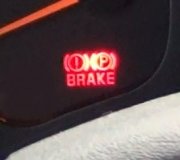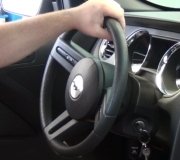Same car, same year, same problem. My wife's front brakes started to grind, I so replaced the front rotors and pads. When I turned the car on and pumped the brake up, it got nice and tight and then lost pressure. I got out of the car and saw a leak in both of the lines leading to the rear of the vehicle in the very same spots. The car was bought and driven in snowy upstate NY so there was a lot of salt that had accumulated at this spot on the lines due to a bracket. I removed a 4 inch section from both of the lines and had some 3/16in line from an old job, which happens to be the correct size, and put them on with compression unions. I'm sure I'll get a talking to about piecing together lines instead of replacing the entire lines, but I'm trying to be within my means I guess.
I got them pieced together and can't find any sign of a leak anywhere. I have bled and bled and bled all 4 lines in the proper sequence, but I just can't get a stiff brake pedal. It just goes straight to the floor without resistance. Plenty of fluid. I've caught every drop as it comes out of the bleeders and it went from a dark grey to extremely clear. There appears to still be air in the lines. I'm going to hook a large syringe and some tubing up to each bleeder and attempt to slowly vacuum each line. Sometimes I feel like I'm getting air in somewhere, because it doesn't seem possible to have that much in there. And I have no noticeable leaks. Maybe I blew a seal in the master cylinder. How can I test to see if I damaged that? I also do not have ABS. I had great pedal until I did this work.
Sunday, July 26th, 2015 AT 10:20 PM


